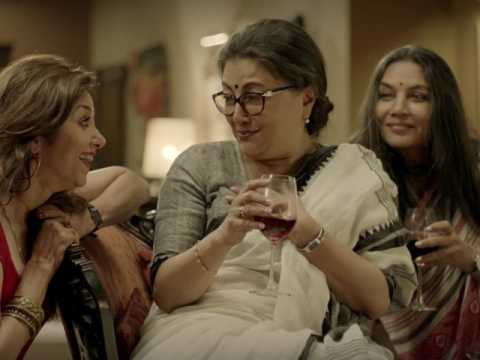
Suparna Thombare
Mumbai, 19 Apr 2017 17:53 IST
Updated: 20 Apr 2017 13:37 IST
The only drawback of this adaptation of Mahesh Eklunchwar's play is that it continues to feel staged.

In Indian cinema, stories revolving around middle-aged women and female bonding are rare. So Sonata is definitely an important film in that respect, as it explores the lives of three independent unmarried women living in Mumbai. What helps is that it does not go down a preachy or serious feminist route. Instead, it takes a simple and real approach.
Directed by Aparna Sen, Sonata sticks closely to the narrative style of the Mahesh Eklunchwar play its based on, exploring the relationship between Aruna Chaturvedi (professor), Dolon Sen (banker) and Subhadra Parekh (journalist), played by Aparna Sen, Shabana Azmi and Lillete Dubey, respectively.
A story of one evening and one location — a city apartment, Sonata, in a sense, makes you feel like a voyeur looking through someone's window to experience the going-ons of this house, just like Dolon, who often peeps into the monotonous life of a neighbour she calls 'Typo' and even makes a reference to Alfred Hitchcock's Rear Window.
Aparna Sen makes sure that you get a sneak peek into the lives of her characters through this one evening they spend together. And you are free to judge and form your own opinions about them. But this is their life and they have chosen to it on their own terms.
The screenplay is built completely on conversations between friends, which is naturally bound to go through its high and lows and move between being funny and loving to emotional and angry. Just like a sonata (or for that matter our lives), which consists of four movements in the typical slow-fast-slow-fast pattern, this conversation, too, moves through various phases and so do your emotions.
Sometimes brisk and attractive and at times leisurely, the narration moves along. Slowly and steadily you get to know each of them and their dynamics better, but despite their inherent complexities, the characters end up feeling like broad strokes.
Dolon is free-spirited and goofy. Her obsession for food and perfumes, and her constant attempt to feel attractive and glamorous is palpable. Aruna, as she is referred to many times by Dolon and Subhadra, is prudish. She is a closed person who is always in control of her emotions, and she is unapologetic about it. Subhadra loves to date men, and most often ends up in tumultous relationships because after a certain age it is difficult to find the right partner. She is happy as long as she is giving it back.
Dolon and Aruna are like soulmates, while Subhadra stops by whenever she needs to be with her friends — they are her transit lounge. All three are hugely successful in their careers and living a great life.
Azmi portrays a character that 'sways through life with abandon' with brilliance. She also subtly portrays her vulnerabilities. Some of her comic moments, including when she vows to move to a healthier lifestyle while munching on snacks and how she waltzes out of her room dressed in a sexy black dress, are very entertaining.
But some of the interactions feel a little stiff. Considering that Dolon and Aruna have lived together for 20 years and are supposed to know each other inside out, their chemisty doesn't flow as naturally throughout. Some of the dialogues and sequences feel forced. Like when they call each other 'my friend' or when Dolon appreaciates Aruna's beauty as Beethovan's Moonlight Sonata plays in the background or when Dolon and Aruna discuss social issues. This screen adaptation continues to feel like a play and that is what is disappointing.
Even then, the understated brilliance of Aparna Sen's storytelling, screenplay and wry humour are palpable. While these unmarried middle-aged women are thought of as selfish and their lives are perceived by society as incomplete, they are just going through life without any regrets as time goes by and death eventually catches up. Aruna and Dolon recall Emily Dickinson's lines — Because I could not stop for death, he kindly stopped for me, the carriage held but just ourselves, and immortality.
And then there are some lovely cinematic moments to cherish. Azmi beautifully singing Rabindranath Tagore's 'Aji Jhorer Raate' is one such. The other being when the three friends sit on the couch and burst out into laughter, realising they haven't laughed that hard in ages.
Sonata resonates with you as at its heart its a story of friendship and companionship. Just like Dolon, Aruna and Subhadra, spend an evening with friends and watch this little gem.
Reviewed by Suparna Thombare